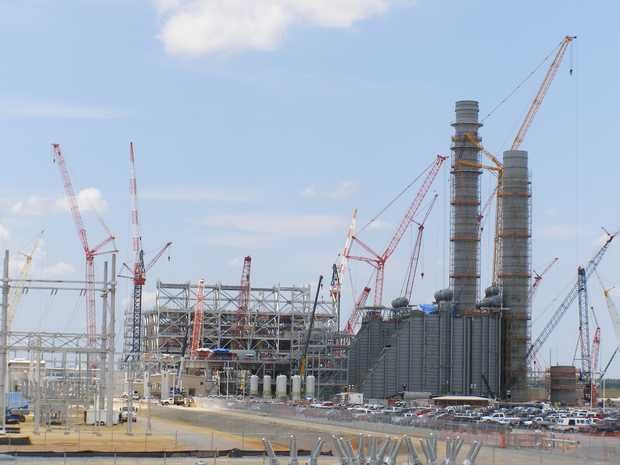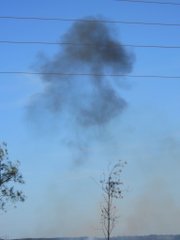Opponents of Mississippi Power's 582-megawatt generating station in Kemper County question if the company's financial setbacks have resulted in a work slowdown at the plant, under construction since 2010. Photo by Courtesy Michael Correro
JACKSON — There's something strange about the sounds in Barbara Correro's backyard lately. Correro, who spends her days gardening organically on 28 wooded acres in De Kalb, noticed birdsongs have reached a crescendo in the past several months.
"It's like I'm living in an aviary," Correro said. She suspects that the boisterous birds are the result of the flutter of activity taking place 2.5 miles away at the site of Mississippi Power Co.'s multi-billion-dollar power plant. Since construction commenced in 2010, Correro and other residents say the utility company has engaged in clear-cutting the 2,968 acres it purchased for its 582-megawatt integrated coal gasification combined station.
Correro is saddened by the fact that animals are losing their habitat--she's also seen more deer closer to houses than before the work at the plant began--and said that the company is burning the trees instead of shredding them and making the mulch available for local gardeners.
But while wildlife activity is picking up, Correro and her neighbors say activity at the plant appears to be slowing. She no longer hears the hours-long rumble of heavy trucks coming and going to the site. On July 10, Correro drove by the site at 10 a.m. and noticed fewer dirt movers and cars in the parking lot than usual. She went back at 8 p.m., when the second shift starts and saw two dozen cars parked out front compared to hundreds she witnessed previously.
"Usually the whole place is lit up" at night, she said. She also noticed that workers quit at 3:30 p.m. Tuesday July 3 and didn't return the following Monday. Correro doubts Mississippi Power, whose parent company is headquartered in Atlanta, was altruistically offering its hardworking labor force an extended Independence Day holiday. This past Christmas, which fell on a Saturday, the crew only got Saturday and Sunday off, she said.
Correro keeps close tabs on what's going on at the plant because she is an avowed opponent of the plant and the accompanying lignite that will fuel it. One explanation for the slowdown is the torrential downpours Mississippi received recently that would have made construction work a messy impossibility. Another: MPC is running out of money.
Facing a protracted legal fight with the Sierra Club--which rarely loses a fight against a coal plant--and with political and economic tides turning from coal generation toward cleaner fuels, Mississippi Power is remaining steadfast in its commitment to burn coal at the Kemper County plant. That stubbornness seems to be coming at the peril of its ratepayers and shareholders.
On July 9, Moody's Investors Service placed Mississippi Power Company's ratings on review for downgrade, reflecting recent Kemper County developments. Moody's states the review reflects, in part, the Mississippi Public Service Commission's recent order denying the company recovery of construction-related debt expenses from its ratepayers until the courts settle the ongoing Sierra Club dispute. The agency's review also points to $366 million in cost overruns at the plant now under construction, which Moody's said "have put the cost of the plant very close to its $2.88 billion MPSC approved cost-recovery cap."
Louie Miller, executive director of the Sierra Club of Mississippi, believes Mississippi Power is close to busting the $2.874 billion cost cap. (Under the agreement with the PSC, the company could only charge ratepayers up to the cap; anything over, the company has to absorb.) Because the report was filed at the end of May, Miller believes MPC could be well over its limit now.
"They're on a collision course in a number of ways. They need to pull the plug on this project," Miller said.
In June, MPC asked state regulators for permission to charge customers $58.6 million in construction-related debt on its $2.76 billion integrated-gasification-combined-cycle plant. In a rare unanimous vote against Mississippi Power, the two Republicans and one Democrat on the commission said "No" to the utility's request that would have averaged out to about $20 extra per month for every MPC customer.
"I am still in support of the Kemper County Plant," said Central District Commissioner Lynn Posey at the time of the commission's June order. "... However, I do not believe it is in the best interest of the ratepayer to increase rates while there is legislation pending before the Mississippi Supreme Court."
On July 9, MPC appealed the commission's ruling to the state Supreme Court arguing the PSC's "arbitrary denial" of a rate increase violates previous agreements to let the utility recover financing costs. On July 3, Fitch Ratings downgraded Mississippi Power's credit rating to "A-" from "A," and changed the company's rating outlook from stable to negative. Fitch, one of the three largest corporate-credit rating agencies, along with Moody's and Standard & Poor's, said the Public Service Commission's refusal to let MPC impose rate hikes to recoup construction-related interest drove the decision to downgrade utility's credit rating.
Mississippi Power braced for the move. "While a cost impact to customers of today's downgrade is expected, the extent of the impact is unknown at this time," MPC spokesman Jeff Shepard said in an emailed statement. "Timely recovery of financing costs is critical to our ability to reduce the overall cost of the project to our customers, to complete the project and to maintain the financial health of the company."
Weeks before the Moody's alert, Fitch also lowered MPC's credit outlook, stating that the PSC's order to deny the rate increase "introduces significant uncertainty" on whether MPC can recover construction-related overruns. Plus, this round of lawsuits could take months to resolve, Fitch said.
Robert Wiygul, the attorney representing the Sierra Club, said it might be October or November 2012 before a judge holds a hearing on the case. He added that he's confident that no matter which way the court rules in the dispute, the losing party is likely to appeal that ruling as well to the state Supreme Court, which might not hear the case until the fall of 2013.
The Sierra Club filed a lawsuit in Harrison County Chancery Court objecting to the PSC's issuing permits to Mississippi Power to keep building the facility. The case stems from a 2011 action when the PSC raised the spending cap on the plant to $2.88 billion from $2.4 billion with no public discussion. The Sierra Club appealed to the state's highest court, arguing that commissioners should have discussed upping the limit in a public meeting. The court ruled in the Sierra Club's favor, remanded the matter back to the commission.
After a brief meeting in April, the PSC voted again to raise the limit on Mississippi Power's credit card. The Sierra Club sued again, this time in Harrison County Chancery Court claiming that the PSC failed to thoroughly vet MPC's proposal before bumping them up to $2.88 billion.
Fitch also cited the plant's riskiness in its assessment: "Kemper IGCC is a relatively large and complex project for a utility of Mississippi Power's size, and the delay in recovery of financing costs has already caused significant stress" on the company's credit metrics.
Wiygul asserts that Kemper has been a bad deal for Mississippi because it broke ground when natural-gas prices were trending downward. He notes that other utility's are switching to cleaner, cheaper and equally abundant natural gas and away from coal.
In 2008, natural gas traded at just under $8 per 1,000 cubic feet. Today, it's closer to $2. Gas' price plunge prompted Omaha, Neb.-based Tenaska Inc., to jettison plans for the only other commercial-scale IGCC development in Taylorville, Ill. In May, the company announced it would pursue a plan to allow "Illinois to take advantage of today's low natural-gas prices to build a necessary new source of electric power resulting in lower overall rates," the Illinois Times reported.
Michael Correro, Barbara's son, lives a mile away in the same neighborhood and said he's also observed work at the site slowing down. Correro, a former librarian, is also against the plant and accompanying mine.
"If they want to convert it to a natural gas plant, I don't really want that in my backyard," he said. "But I could live with that."




Comments